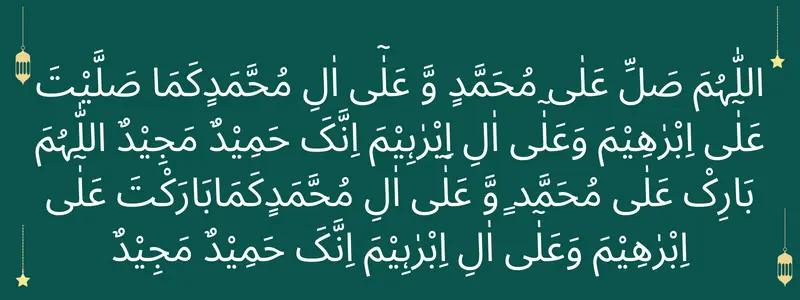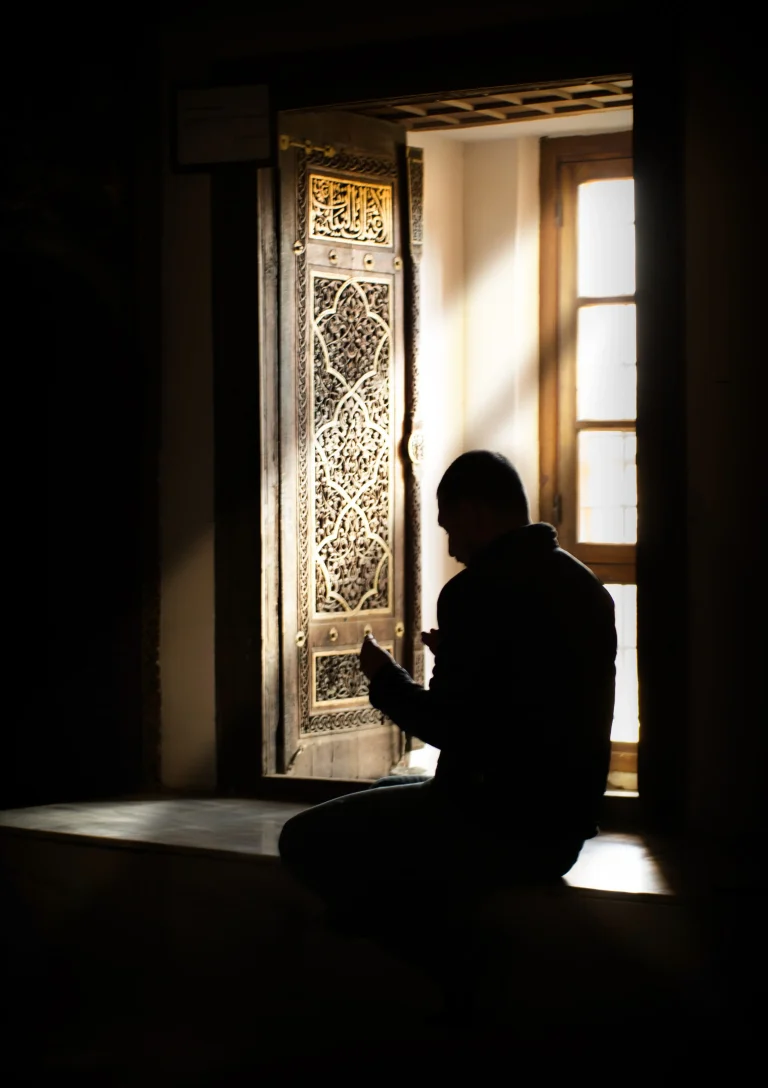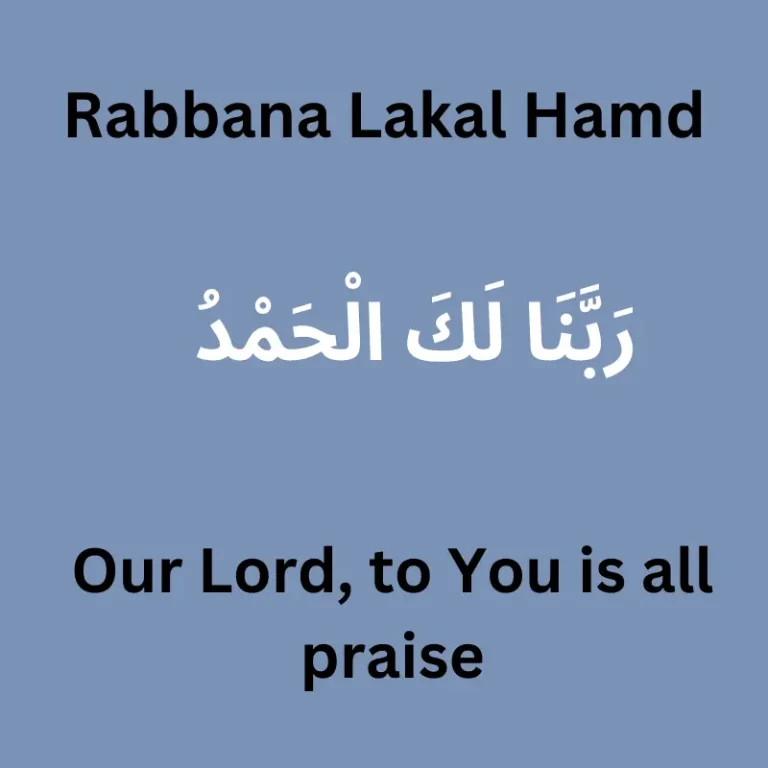Durood e Ibrahim

Durood e Ibrahimi in English
“O Allah, bestow blessings upon Muhammad and the family of Muhammad, as You bestowed blessings upon Ibrahim and the family of Ibrahim. You are indeed praiseworthy and glorious. O Allah, bless Muhammad and the family of Muhammad, as You blessed Ibrahim and the family of Ibrahim. You are indeed praiseworthy and glorious.”
Durood E Ibrahim In Roman English
Allahumma Sallee ‘Alaaa Muhammadinw Wa Alaa Aaali Muhammadin Kamaa Sallaeta ‘Alaa Ibraa heema Wa Alaa Aaali Ibraa heema In-naka Hameedum Majeed. Allahumma Barik ‘Alaa Muhammadinw Wa Alaa Aaali Muhammadin Kama Barak-ta ‘Alaa ibraaheema Wa Alaa Aaali Ibraa heema In-naka Hameedum Majeed.
Durood e Ibrahim in Hindi
अल्लाहुम्मा सल्ली अला मुहम्मदिव व अला आली मुहम्मदिन कमा सल्लैता अला इब्राहीमा व अला आली इब्राहीमा इन्नका हमीदुम मजीद |
अल्लाहुम्मा बारिक अला मुहम्मदिव व अला आली मुहम्मदिन कमा बारकता अला इब्राहीमा व अला आली इब्राहीमा इन्नका हमीदुम मजीद।
Durood e Ibrahim in Urdu
اے اللہ تعالیٰ رحمت نازل فرما محمد صلی اللہ علیہ وسلم پر اور انکی آل پر جیس طرح تو نے رحمت فرمائی ابراہیم پر اور ان کی آل پر بے شک تو تعریف کے لائق اور بڑی بزرگی ، عظمت والا ہے۔ مفہوم : اے اللہ تعالیٰ برکت نازل فرما محمد صلی اللہ علیہ وسلم پر انکی آل پر جس طرح تو نے برکت فرمائی ابراہیم پر اور انکی آل پر بے شک تو تعریف کے لائق اور بڑی بزرگی ، عظمت والا ہے۔
Durood e Ibrahim Bangla
হে আল্লাহ! তুমি মুহাম্মদ ও তার বংশধরের উপর রহমত বর্ষণ কর, যেমন তুমি হজরত ইব্রাহিম ও তাঁর বংশধরের উপর রহমত বর্ষণ করেছ। নিশ্চয় তুমি প্রশংসিত গৌরবান্বিত।
হে আল্লাহ! তুমি হজরত মুহাম্মদ ও তার বংশধরের উপর বর্কত বর্ষণ কর, যেমন তুমি হজরত ইব্রাহিম ও তার বংশধরের উপর বর্কত বর্ষণ করেছ। নিশ্চয় তুমি প্রশংসিত গৌরবান্বিত।
What is Durood e Ibrahimi
Durood-e-Ibrahimi, also known as the Ibrahimic Salutation or the Blessings upon Prophet Ibrahim, is a specific supplication and blessing recited by Muslims to honor and seek blessings for the Prophet Muhammad. It is named after Prophet Ibrahim (Abraham) because it follows the pattern of blessings mentioned in the Quran when Allah commanded Prophet Ibrahim to send blessings upon himself and his descendants.
Muslims recite the Durood-e-Ibrahimi as a way to express their love, respect, and reverence for the Prophet Muhammad. It is recited in various Islamic gatherings, prayers, and personal supplications as a means of seeking blessings and drawing closer to Allah through honoring His beloved Messenger.
The Durood-e-Ibrahimi serves as a reminder of the strong bond between the believers and the Prophet Muhammad. It is a way to demonstrate gratitude to Allah for sending such a noble and guiding figure to humanity. The supplication is a means to seek blessings and spiritual elevation, as well as to seek intercession through the Prophet’s status with Allah.
Virtues of Darood Ibrahimi
There are several benefits of reading Durood e Ibrahimi for 100 times. Some of the virtues associated with the Darood-e-Ibrahimi are as follows:
Divine Blessings: Reciting the Darood-e-Ibrahimi brings about an abundance of blessings from Allah. It is a means of seeking His favor and mercy upon the reciter, as well as upon the Prophet Muhammad and his family.
Proximity to the Prophet: By sending blessings upon the Prophet Muhammad through the Darood-e-Ibrahimi, believers establish a closer spiritual connection with him. This connection fosters love, reverence, and a deep sense of attachment to the Prophet.
Intercession: The Darood-e-Ibrahimi serves as a means of seeking the Prophet Muhammad’s intercession on behalf of the reciter. Muslims believe that the Prophet holds a special status and influence with Allah, and invoking his blessings can serve as a source of intercession and assistance.
Spiritual Purification: Reciting the Darood-e-Ibrahimi purifies the heart and soul of the believer. It is an act of devotion and humility, reflecting the sincere love and respect for the Prophet Muhammad. This act of remembrance and supplication brings about spiritual tranquility and uplifts the soul.
Forgiveness of Sins: The Darood-e-Ibrahimi is believed to be a means of seeking forgiveness for one’s sins. By reciting this salutation, believers express remorse for their shortcomings and seek Allah’s forgiveness through the Prophet Muhammad’s intercession.
Increase in Rewards: Each recitation of the Darood-e-Ibrahimi earns immense rewards from Allah. The more frequently it is recited, the greater the blessings and multiplied rewards the believer receives. It is a simple yet powerful act of worship that brings abundant spiritual benefits.
Unity and Love: Reciting the Darood-e-Ibrahimi is a unifying practice for the Muslim community. It fosters a sense of love, unity, and brotherhood among believers, as they collectively send blessings upon the Prophet Muhammad. It transcends barriers of language, culture, and ethnicity, uniting Muslims in their devotion to the Prophet.
Elevation of Status: Consistent recitation of the Darood-e-Ibrahimi elevates the spiritual status of the believer. It is a virtuous act that draws the attention and blessings of Allah, leading to increased spiritual growth and proximity to Him.
When to read Durood Shareef in namaz?
The recitation of Durood Shareef, also known as Salawat or Salutations upon the Prophet Muhammad, holds great significance in the prayers (namaz) of Muslims.
The Tashahhud is a crucial part of the prayer performed in the sitting position. It is in this posture that Muslims recite the Durood Shareef, known as Durood Ibrahim. After reciting the Tashahhud, believers send blessings upon the Prophet Muhammad by reciting the following words: “Allahumma salli ‘ala Muhammadin wa ‘ala ali Muhammadin, kama sallaita ‘ala Ibrahim wa ‘ala ali Ibrahim, innaka Hamidun Majid.”








